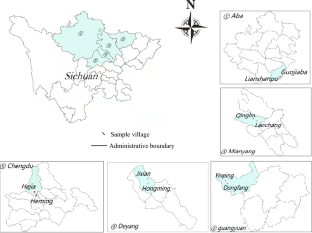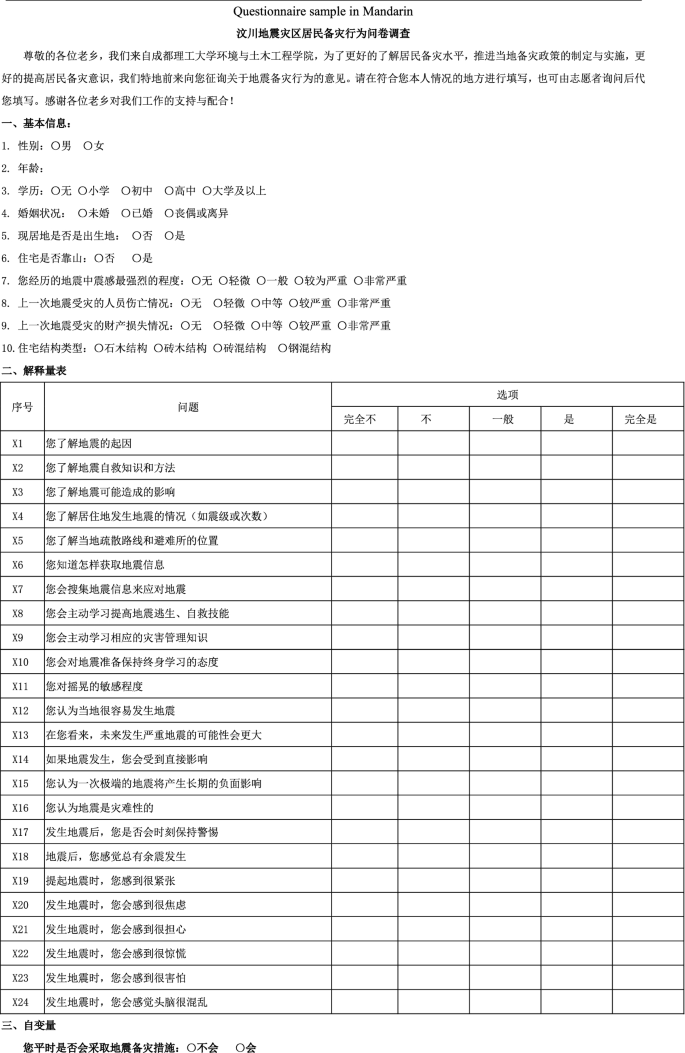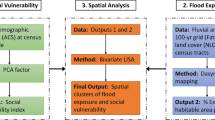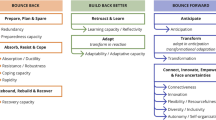Abstract
Earthquake preparedness can reduce casualties and economic losses caused by earthquakes effectively. Existing literature confirms that people’s knowledge and perception of earthquakes can affect their actions concerning earthquake preparedness greatly. However, studies have mostly focused on developed countries. Meanwhile, China, particularly its rural regions, has been neglected. In addressing this deficiency, this study examines 5 counties and 10 villages that were seriously affected by the 2008 Wenchuan (Sichuan) earthquake. Using an on-site survey of residents, earthquake perceptions and their impact on disaster preparedness behavior were examined empirically. Exploratory factor analysis and random-effect logistic regression analysis were used. The results reveal that two factors considerably influence disaster preparedness behavior. First, residents with autonomous earthquake information access tend to be more prepared. Second, residents who are more sensitive about earthquakes (high perceived risk of occurrence) tend to be more prepared for earthquakes. Evidently, knowledge and awareness of earthquakes have a positive impact on the disaster preparedness of residents living in rural earthquake-prone regions. Consequently, government agencies should enhance the earthquake education of local residents as part of the national effort to mitigate the adverse effects of future earthquakes.

Similar content being viewed by others
References
Ablah E, Konda K, Kelley CL (2009) Factors predicting individual emergency preparedness: a multi-state analysis of 2006 BRFSS data. Biosecur Bioterror 7(3):317–330
Aspinwall LG, Sechrist GB, Jones PR (2005) Expect the best and prepare for the worst: anticipatory co** and preparations for Y2K. Motiv Emotion 29(4):353–384
Azim MT, Islam MM (2016) Earthquake preparedness of households in Jeddah, Saudi Arabia: a perceptual study. Environ Hazards 15(3):189–208
Baker EJ (2011) Household preparedness for the aftermath of hurricanes in Florida. Appl Geogr 31(1):46–52
Baker LR, Baker MD (2010) Disaster preparedness among families of children with special health care needs. Disaster Med Public 4(3):240–245
Becker JS, Paton D, Johnston DM, Ronan KR (2012) A model of household preparedness for earthquakes: How individuals make meaning of earthquake information and how this influences preparedness. Nat Hazards 64(1):107–137
Brenkert-Smith H, Champ PA, Flores N (2006) Insights into wildfire mitigation decisions among wildland-urban interface residents. Soc Nat Resour 19(8):759–768
Calvello M, Papa MN, Pratschke J, Crescenzo MN (2016) Landslide risk perception: a case study in Southern Italy. Landslides 13(2):349–360
Cui P, Lin Y, Chen C (2012) Destruction of vegetation due to geo-hazards and its environmental impacts in the Wenchuan earthquake areas. Ecol Eng 44:61–69
Dooley D, Catalano R, Mishra S, Serxner S (1992) Earthquake preparedness: predictors in a community survey 1. J Appl Soc Psychol 22(6):451–470
Du Y, Ding Y, Li Z, Cao G (2015) The role of hazard vulnerability assessments in disaster preparedness and prevention in China. Military Med Res 2(1):1–7
Ge Y, Gu Y, Deng W (2010) Evaluating China’s national post-disaster plans: the 2008 Wenchuan earthquake’s recovery and reconstruction planning. Int J Disaster Risk Sci 1(2):17–27
Goltz JD, Bourque LB (2017) Earthquakes and human behavior: a sociological perspective. Int J Disaster Risk Reduct 21:251–265
Goltz JD, Russell LA, Bourque LB (1992) Initial behavioral response to a rapid onset disaster: a case study of the October 1, 1987, Whittier Narrows earthquake. Int J Mass Emerg Disasters 10(1):43–69
Griffin RJ, Dunwoody S, Neuwirth K (1999) Proposed model of the relationship of risk information seeking and processing to the development of preventive behaviors. Environ Res 80(2):S230–S245
Han Z, Wang H, Du Q, Zeng Y (2017) Natural hazards preparedness in Taiwan: a comparison between households with and without disabled members. Health Secur 15(6):575–581
Heller K, Alexander DB, Gatz M, Knight BG, Rose T (2005) Social and personal factors as predictors of earthquake preparation: the role of support provision, network discussion, negative affect, age, and education 1. J Appl Soc Psychol 35(2):399–422
Huang Y, Chen W, Liu J (2012) Secondary geological hazard analysis in Beichuan after the Wenchuan earthquake and recommendations for reconstruction. Environ Earth Sci 66(4):1001–1009
Koshiba Y, Hayashibara N, Suzuki Y, Ohtani H (2012) Usefulness of fire drills in each university building. J Environ Saf 3:87–95
Levac J, Toal-Sullivan D, O’Sullivan TL (2012) Household emergency preparedness: a literature review. J Commun Health 37(3):725–733
Li S, Zhai G, Zhou S, Fan C, Wu Y, Ren C (2017) Insight into the earthquake risk information seeking behavior of the victims: evidence from Songyuan, China. Int J Environ Res Pub Health 14(3):267
Liang Y, Cheng J, Ruzek JI, Liu Z (2019) Posttraumatic stress disorder following the 2008 Wenchuan earthquake: a 10-year systematic review among highly exposed populations in China. J Affect Disord 243:327–339
Lindell MK, Hwang SN (2008) Households’ perceived personal risk and responses in a multihazard environment. Risk Anal 28(2):539–556
Lindell MK, Perry RW (2012) The protective action decision model: theoretical modifications and additional evidence. Risk Anal 32(4):616–632
Lindell MK, Whitney DJ (2000) Correlates of household seismic hazard adjustment adoption. Risk Anal 20(1):13–26
Lindell MK, Prater CS, Wu HC, Huang SK, Johnston DM, Becker JS, Shiroshita H (2016) Immediate behavioural responses to earthquakes in Christchurch, New Zealand, and Hitachi. Jpn Disasters 40(1):85–111
Lo AY, Cheung LT (2015) Seismic risk perception in the aftermath of Wenchuan earthquakes in southwestern China. Nat Hazards 78(3):1979–1996
Mabuku MP, Senzanje A, Mudhara M, Jewitt G, Mulwafu W (2018) Rural households’ flood preparedness and social determinants in Mwandi district of Zambia and Eastern Zambezi Region of Namibia. Int J Disaster Risk Reduct 28:284–297
Martins VN, Nigg J, Louis-Charles HM, Kendra JM (2019) Household preparedness in an imminent disaster threat scenario: the case of superstorm sandy in New York City. Int J Disaster Risk Reduct 34:316–325
Mcneill IM, Dunlop PD, Heath JB, Skinner TC, Morrison DL (2013) Expecting the unexpected: predicting physiological and psychological wildfire preparedness from perceived risk, responsibility, and obstacles. Risk Anal 33(10):1829–1843
Miceli R, Sotgiu I, Settanni M (2008) Disaster preparedness and perception of flood risk: a study in an alpine valley in Italy. J Environ Psychol 28(2):164–173
Mishra S, Suar D (2007) Do lessons people learn determine disaster cognition and preparedness? Psychol Dev Soc 19(2):143–159
Mulilis JP, Lippa R (1990) Behavioral change in earthquake preparedness due to negative threat appeals: a test of protection motivation theory. J Appl Soc Psychol 20(8):619–638
Paul BK, Bhuiyan RH (2010) Urban earthquake hazard: perceived seismic risk and preparedness in Dhaka City. Bangladesh Disasters 34(2):337–359
Rüstemli A, Karanci AN (1999) Correlates of earthquake cognitions and preparedness behavior in a victimized population. J Soc Psychol 139(1):91–101
Shah AA, Shaw R, Ye J, Abid M, Amir SM, Pervez AK, Naz S (2019) Current capacities, preparedness and needs of local institutions in dealing with disaster risk reduction in Khyber Pakhtunkhwa, Pakistan. Int J Disaster Risk Reduct 34:165–172
Shaw R, Kobayashi KSH, Kobayashi M (2004) Linking experience, education, perception and earthquake preparedness. Disaster Prev Manag 13:39–49
Sıdıka TY, Necati D, Charlotte BF, Marcel T (2010) Factors motivating individuals to take precautionary action for an expected earthquake in Istanbul. Risk Anal 30(8):1181–1195
Siegrist M, Gutscher H (2006) Flooding risks: A comparison of lay people’s perceptions and expert’s assessments in Switzerland. Risk Anal 26(4):971–979
Siriwardena M, Malalgoda C, Thayaparan M, Amaratunga D, Keraminiyage K (2013) Disaster resilient built environment: Role of lifelong learning and the implications for higher dducation. Int J Strateg Prop Manag 17(2):174–187
Slovic P (1993) Perceived risk, trust, and democracy. Risk Anal 13(6):675–682
Slovic P (1999) Trust, emotion, sex, politics, and science: Surveying the risk-assessment battlefield. Risk Anal 19(4):689–701
Soffer Y, Goldberg A, Adini B, Cohen R, Ben-Ezra M, Palgi Y, Essar N, Bar-Dayan Y (2011) The relationship between demographic/educational parameters and perceptions, knowledge and earthquake mitigation in Israel. Disasters 35(1):36–44
Spittal MJ, McClure J, Siegert RJ, Walkey FH (2008) Predictors of two types of earthquake preparation: survival activities and mitigation activities. Environ Behav 40(6):798–817
Wang S, Tang W, Qi D, Li J, Wang E, Lin Z, Duffield CF (2017) Understanding the role of built environment resilience to natural disasters: lessons learned from the Wenchuan earthquake. J Perform Constr Facil 31(5):04017058
Wei H-H, Sim T, Han Z (2019) Confidence in authorities, neighborhood cohesion and natural hazards preparedness in Taiwan. Int J Disaster Risk Reduct 40:101265
Wu G, Han Z, Xu W, Gong Y (2018) Map** individuals’ earthquake preparedness in China. Nat Hazard Earth Sys 18(5):1315–1325
Xu D, Peng L, Liu S (2018) Influences of risk perception and sense of place on landslide disaster preparedness in southwestern china. Int J Disaster Risk Sci 9(2):167–180
Zhang L, Liu X, Li Y, Liu Y, Liu Z, Lin J, Shen J, Tang X, Zhang Y, Liang W (2012) Emergency medical rescue efforts after a major earthquake: lessons from the 2008 Wenchuan earthquake. Lancet 379(9818):853–861
Acknowledgment
The authors appreciate financial support from Sichuan Province Social Science Planning project (SC19TJ030), Sichuan Science and Technology Department soft science major work support research project (20RKX0412/2020JDR0177), Sichuan Rural Community Governance Research Center funding (SQZL2019C01), Ministry of Education industry-school cooperative education program (201901098002), Funding for key teachers of Chengdu University of Technology (10912-KYGG2019-02305), the Natural Science Key Project from the Sichuan Provincial Department of Education (18ZA0048), and the Development Research Center of Oil and Gas, Sichuan (CYQK-SKB17-04), the Research Center for Systems Science & Enterprise Development, Key Research of Social Sciences Base of Sichuan Province (Xq17B05), the Electronic Commerce and Modern Logistics Research Center Program, Key Research Base of Humanities and Social Science, Sichuan Provincial Education Department (DSWL17-13).
Author information
Authors and Affiliations
Contributions
All authors contributed to the research presented in this paper. Yibin Ao, Hongying Zhang had the original idea for the study; the co-authors conceived and designed the questionnaire. Linchuan Yang and Yan Wang organized the investigation; Hongying Zhang analyzed the data and drafted the manuscript, which was revised by Igor Martek and Linchuan Yang. All authors have read and approved the final manuscript.
Corresponding author
Ethics declarations
Conflict of interest
The authors declare that they have no conflict of interest.
Ethical approval
The Office of Humanities of Social Sciences of the Chengdu University of Technology approved this study.
Additional information
Publisher's Note
Springer Nature remains neutral with regard to jurisdictional claims in published maps and institutional affiliations.
Appendix
Appendix
Table A1

Table A2

Rights and permissions
About this article
Cite this article
Ao, Y., Zhang, H., Yang, L. et al. Impacts of earthquake knowledge and risk perception on earthquake preparedness of rural residents. Nat Hazards 107, 1287–1310 (2021). https://doi.org/10.1007/s11069-021-04632-w
Received:
Accepted:
Published:
Issue Date:
DOI: https://doi.org/10.1007/s11069-021-04632-w




